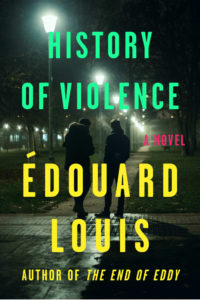
In his New York Times review of Tommy Orange’s widely lauded debut novel, There There, Brooklyn and The Master author Colm Tóibín calls the book “an ambitious meditation on identity and its broken alternatives.” Over at the Los Angeles Times, Walton Muyuma praises Terrance Hayes’ new poetry collection, American Sonnets for My Past and Future Assassins, writing of Hayes’ poetry: “[it] demonstrates a serious commitment to revising, extending and advancing American poetry while recording, celebrating and mourning black American life.” In his Guardian review, celebrated chronicler of gay life and sexuality Edmund White considers French wunderkind Édouard Louis’ latest harrowing work of auto fiction, History of Violence. We also take a second look at Kristen Martin’s fascinating BOMB essay on Rosalie Knecht’s Who is Vera Kelly?, a lesbian spy thriller set in 1960s Argentina, and Michael Schaub’s NPR rave of Fatima Farheen Mirza’s debut novel, A Place for Us.
*
“In Tommy Orange’s There There, an ambitious meditation on identity and its broken alternatives, on myth filtered through the lens of time and poverty and urban life, on tradition all the more pressing because of its fragility, it is as if he seeks to reconfigure Oakland as a locus of desire and dreams, to remake the city in the likeness of his large and fascinating set of characters … Orange makes Oakland into a ‘there’ that becomes all the more concretely, emphatically and fully so in a novel that deals, in tones that are sweeping and subtle, large-gestured and nuanced, with what the notion of belonging means for Native Americans … The novel, then, is their picaresque journey, allowing for moments of pure soaring beauty to hit against the most mundane, for a sense of timelessness to be placed right beside a cleareyed version of the here and now, for a sense of vast dispossession to live beside day-to-day misery and poverty. Nothing in Orange’s world is simple, least of all his characters and his sense of the relationship between history and the present. Instead, a great deal is subtle and uncertain in this original and complex novel.”
–Colm Tóibín on Tommy Orange’s There There (The New York Times Book Review)
*

“Louis’s greatest strength as a writer is that he feels things so passionately, sometimes to the point of obsession, but that he also has a philosophical turn of mind that explores, rather than neutralises, his feelings … The novel is superb at vividly recording the post-traumatic repercussions of rape. In spite of all his previous beliefs, Édouard becomes racist towards dark-skinned men. In this age of political correctness, it takes authorial courage to examine the irrational side of human reactions … Most people mythologise the past and turn traumas into fables. Only rarely does someone remember all the horrid little facts of a past aggression or indignity; Louis has just that sort of painful but necessary recall. He doesn’t correct his past thoughts to agree with the present ones. Why is this a novel rather than a memoir? The main character shares a name and all biographical details with the author. Perhaps a ‘novel’ is more representative and less eccentric than a memoir. Or, just as Louis felt the need to screen or distribute the painful narrative by giving parts of it to his sister, to tell part of it in the third person, so the artifice of fiction was necessary to tell this most woeful of stories.”
–Edmund White on Édouard Louis’ History of Violence (The Guardian)
*
“Now’s the time for Terrance Hayes’ electric new book … Hayes innovates new poetic forms and hacks the codes of canonical containers, pimping them up dynamically … His writing demonstrates a serious commitment to revising, extending and advancing American poetry while recording, celebrating and mourning black American life … Unlike an authoritarian politico ruling by whimsy, the poet working with the American sonnet must identify her métier, improvise rhyme and meter, and communicate resolutions in order to rule the crown. In these sequences, Hayes improvises voices and selves that challenge and attempt escape from virulent, American modes of masculinity.”
–Walton Muyumba on Terrance Hayes’ American Sonnets for My Past and Future Assassin (The Los Angeles Times)
*
“The distance between Vera’s backstory and her mission in Argentina sets Knecht’s novel apart, making it more than just a suspense-driven romp of Cold War covert ops. Vera is no James Bond, with his glamour and gadgets, nor is she the anti-James Bond, John le Carré’s George Smiley, the bland, bespectacled, and balding expert in tradecraft. Vera is a deeply lonely lesbian living in a time of vice squads, and her history is as crucial to the plot as any suspicious man in a trench coat … What kept me turning the pages in Who is Vera Kelly was not so much a desire to find out what Vera’s spying would reveal about Román’s plotting and its relationship to the coup. Instead, I found myself drawn to the bildungsroman folded into the spy novel. Balancing those two elements in alternating chapters that read like Vera’s diary entries, Knecht imbues the novel with emotional depth that allows for meditation on human connection and the ties that bind us to life’s worth.”
–Kristin Martin on Rosalie Knecht’s Who is Vera Kelly? (BOMB)
*
“Mirza’s book gets to a universal truth: To be part of a family is to learn how to be more than one person, how to remain an individual while fulfilling the duties we have to those who love us, who made us … A Place for Us is a stunning novel about love, compassion, cruelty and forgiveness—the very things that make families what they are … The structure of A Place for Us is unconventional; the novel goes back and forth in time, switching points of view. This isn’t the easiest thing to pull off, but Mirza executes it perfectly, creating a constant tension in the narrative that keeps readers turning the pages, but is never cheap or exploitative. And her writing is gorgeous, unadorned but beautiful … Mirza, 27, writes with more grace and self-confidence than many authors who have been publishing before she was born, and it’s going to be fascinating to see what she does next.”
–Michael Schaub on Fatima Farheen Mirza’s A Place for Us (NPR)

